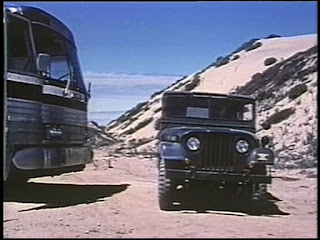Next up, two films that take pre-existing footage, and wrap it in new packaging to make a buck.
Hard to resent them for it, though, when we consider what we get in return: delicious analog synth soundtracks, and huge panels full of old-school dials, knobs, and LEDs.
Hard to resent them for it, though, when we consider what we get in return: delicious analog synth soundtracks, and huge panels full of old-school dials, knobs, and LEDs.
[aka Der schweigende Stern]
Grade: C-
It's no secret -- it's so well-known as to be proverbial -- that America's troubled race relations (to put it euphemistically) were a focal point of Iron Curtain critiques: how could they not be?
So when Poland and East Germany got together to make a spectacularly expensive film about an expedition to Venus in 1985 (sigh), it wasn't an accident that they cast black (Julius Ongewe) and Asian (Yoko Tani, Hua-Ta Tang) actors in prominent roles.
It wasn't altruism either, of course: no doubt the intent was consciously propagandistic -- an attempt to gain an edge, however slight, in a global struggle.
But because the makers of First Spaceship on Venus took a "show, don't tell" approach, and didn't foreground the blackness or Asianness of these characters, the net result is remarkably modern. The technician Talua, the physician Sumiko, and biologist/linguist Tchen-Yu are members of a team, characterized by what they contribute, not where they happen to come from.
Of course, then they have a white guy (Kurt Rackelmann) play an Indian mathematician, so all bets are off.
There's not much point to recapping the plot of First Spaceship on Venus, though the MacGuffin here is a bit different from Planet of Storms et al. Instead of receiving a message from another planet, or simply going there for its own sake, the Earth forces have discovered a message that was already here: spooky!
Unearthed at an irrigation site in the Gobi desert, this magnetic spool appears to have originated from Venus, and clearly contains significant data -- expressed, of course, as a series of dank analog synth sounds.
So we'd better check it out in person -- and send a cute robot too!
Speaking of the robot, we owe First Spaceship on Venus an apology. In this scene we noticed, to our great irritation, that White couldn't possibly give mate after 1...Kh8 2. Kxe7, as announced by the computer. But that's almost certainly an error in the dubbed soundtrack, as the correct move is clearly made on the board: 2. Kf7, with the inevitable result of 2...e5 (or 2...e6) 3. Bg7#.
If we were more literate chess scholars we'd know the study from which this was taken; maybe something by Rinck? Either way, they clearly did their homework, so everybody gets an A!
"Iron Curtain film about an expedition to Venus" seems like a reasonable basis for comparing jabłka to яблоки. But ultimately First Spaceship on Venus, while fun, doesn't reach the same heights as Planet of Storms -- though some of the sets are kinda groovy.
And no, we're not just lamenting the absence of Masha, whose equivalent here is certainly Sumiko. Yoko Tani shows herself to be perfectly capable of doing the whole "talking on the radio while crying" thing, which is no doubt someone's kink somewhere.
We also get black goo that threatens to engulf the cast members, à la Tasha Yar. No doubt that's someone's kink too.
Objective Grade: F
Holographic Hitler Helpout: D+
More than once, over the course of this project, we've seen the opening minutes of a movie and felt unsure as to whether we were about to see a very good film, or a very bad one. Maybe it's because films at either end of the quality continuum tend to write their own rules, and construct sequences that don't seem bound by the predictable progression of genre norms.
Or maybe it's because we particularly appreciate films that have a lot of space in them? Good films do this because they want to create a world that we, as viewers, can inhabit -- or because they understand how the "hard sell" can actually be a turnoff, inhibiting our emotional response -- or simply because they have dynamic range, incorporating loud and soft, fast and slow.
Bad films do this to pad their running time. And for a while, the net result can be the same.
The real test is whether you can follow up your understated intro with something that rewards, intrigues, and gratifies the patient viewer. If you've ever seen a film or TV show with a compelling premise that turns out to be a shaggy-dog story, you know the feeling of disappointment that hits you around the 85% mark, when you realize they're just going to cobble together some contrived, unsatisfying, bullshit explanation for everything that seemed so tantalizingly, explicably mysterious a few minutes ago.
After this happens enough times, you develop a growing suspicion of mysteries that seem to be building layer upon layer of impenetrability -- because you no longer trust them to pay off.
When it comes to nostalgic intros to 1970s productions, though, we're still trusting souls. Show us someone wandering a natural landscape, alone, as the camera films from overhead. Give us an enigmatic, contemplative voiceover. Follow it up with melancholy music as the credits roll. Put it all right at the edge of loss, of fading away -- a piece of film in a closet somewhere, alongside the Beartooths and Idaho Transfers of the world.
In other words, these are our buttons: push them.
And for the first 10 minutes or so of The Lucifer Complex, we wanted to believe. Oh, how we wanted to believe.
Even when the nameless protagonist (William Lanning) started cueing up assorted footage from the past, each clip playing in a little window as if this were an elegiac Sega CD game from the early 1990s, we still hoped all this might amount to some sort of meditative piece -- call it The Library That Survived Armageddon -- from the National Film Board of Canada.
(Or just Boards of Canada, that would work too.)
Hell, we held out hope even after the film offered up endless, exploitative shots of real-world violence, including scenes of actual starving people...kind of like Commando Mengele/Angel of Death: funny how that film seems to be coming up a lot lately.
In the midst of that, we get live footage of the Edgar Kelly Band, a regional act meant to represent the big rock concerts of the 1960s. Each shot is carefully curated to make a crowd of about 20 people seem like 20,000.
So is this As I Watched: The Movie? Which would basically be The White Gorilla 2, minus the gorilla. Ergo, White Primate in a Cave, Watching Other People Do Things. Yes?
Maybe we could live with that, I guess. But wait, what about this guy? Where's he?
So, out with it: the first 20 minutes of The Lucifer Complex are nothing more than an elaborate intro for a shitty, unfinished movie about secret Nazis in South America, starring Robert Vaughn and Keenan Wynn.
That's it. That's what all these nostalgic helicopter shots and edutainment clips are building towards: nothing. They're just padding. They just wanted to salvage the footage from a shitty unfinished Nazi movie -- Hitler's Wild Women was the working title, if that gives you an idea -- and make a buck.
Now, to be clear, this particular shitty Nazi movie is hilariously bad (though not nearly as fun as Commando Mengele). OK, it's almost intriguing for about 10 minutes, when it's not clear why a bunch of dignitaries have been gassed to death aboard a bus --
-- or why Vaughn gets clocked when he goes to check the situation out.
But soon enough, Nazis.
And Robert Vaughn, looking pissed off -- does he ever not look pissed off? -- in an elevator, with men with ridiculous sunglasses and mustaches and head wraps.
And a fetus in a vessel.
And more Nazis. Lady Nazis.
And long battle sequences in which Vaughn conveniently isn't visible, since he's allegedly inside a tank. That'll save some $$$.
And Hitler also shows up --
-- and he shoots lasers at people.
And then the guy in the cave goes for a walk, because everyone else is dead. The end.

























































